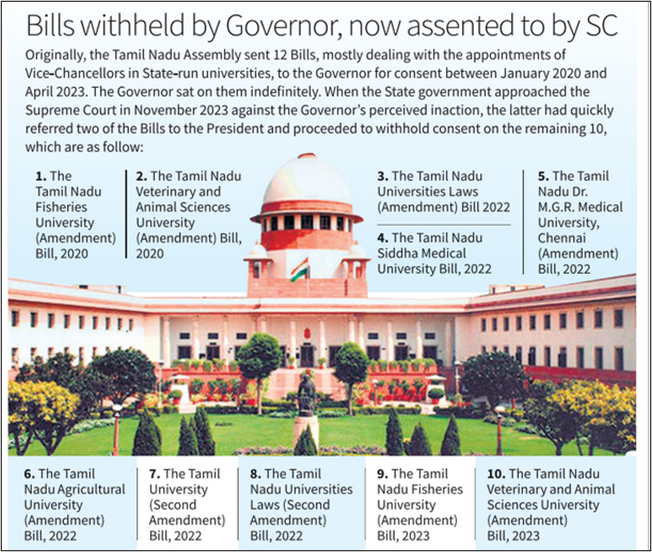PREVIOUS
Tamil Nadu vs. Governor of Tamil Nadu case
April 11 , 2025
5 days
296
0
- The Supreme Court held that Tamil Nadu Governor R.N. Ravi’s reservation of 10 bills for President’s assent is “illegal and liable to be set aside”.
- A Bench of the Justices J.B. Pardiwala and Justice R. Mahadevan bench have unanimously pronounced the judgement.
- The court said that under Article 200 of the Constitution, the Governor does not possess any discretion and has to mandatorily act on the aid and advice of the council of ministers.
- Article 200 of the Constitution deals with assent to Bills.
- Timelines prescribed for Governors when Bills are presented to them:
- In case of withholding assent, one month
- In case of withholding assent contrary to advise of the State Cabinet, three months
- In case of Bills presented for reconsideration by Governors, one month
- The Bench said the Governor cannot withhold the assent and adopt concept of absolute veto or pocket veto.
- It said the Governor is obligated to adopt one course of action — give assent to Bills, withhold assent and reserve for consideration of the president.
- The Bench said the Governor must assent to the Bills produced before him in the second round, and the only exception is in case the Bill in the second round is different from the first one.
- The bench also reiterated that the constitutional scheme does not make place for the idea of an “absolute veto” or a “pocket veto”.
- The bench concerned that there was no reason of long period of time taken by the Governor and “scant respect” shown to the past judgments of the Supreme Court (the State of Punjab judgement).
- The Bench invoked its inherent powers under Article 142 of the Constitution to declare that 10 Bills have been deemed to have been assented to.
- In closing, Justice Pardiwala invoked the words of Dr. B.R. Ambedkar: “However good a constitution may be, if those who are implementing it are not good, it will prove to be bad. However bad a constitution may be, if those implementing it are good, it will prove to be good.”
- The court emphasised that the Governor must act in accordance with the “settled conventions of Parliamentary democracy.”
- The Governor is not a political actor, but a “friend, philosopher and guide”.
Background
- In Tamil Nadu’s case, originally 12 Bills are mostly dealing with appointments of Vice-Chancellors in State universities.
- These were sent by the State Legislature for consent to the Governor under Article 200 of the Constitution between January 2020 and April 2023.
- The Governor had sat on them indefinitely.
- Ultimately, when the State had approached the top court against the Governor’s perceived inaction in November 2023, the latter had quickly referred two of the Bills to the President and proceeded to withhold consent on the remaining 10.
- The State Assembly had re-passed the 10 Bills in a Special Session within days, and had sent them to the Governor again for assent.
- The State argued in the apex court that it was following procedure under the first provision of Article 200.
- The Governor had proceeded to refer all of those 10 Bills to the President for consideration.
- The President had subsequently assented to only one Bill, rejected seven and not considered the remaining two proposed laws.

Leave a Reply
Your Comment is awaiting moderation.


